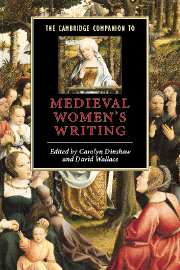2 - Virginities
from Part I - Estates of women
Published online by Cambridge University Press: 28 May 2006
Summary
How do you know that someone is a virgin? This question is implicitly posed in the Nativity pageant of the N-town collection of biblical drama, just after Mary has given birth. Salomée, one of the two midwives attendant on Mary, refuses to believe that the Virgin is still a virgin. She insists on 'touching' Mary's body. Terrifyingly, her hand turns 'ded and drye [withered] as claye [earth]' (line 256). An angel appears, and orders her to touch Jesus' swaddling-clothes. Frightened, Salomée obeys the angel and the hand is miraculously restored to health. But a number of questions are left unanswered. Since female roles were all played by men, the scene calls for some ingenuities of staging and suspension of audience disbelief. Readers today may wonder why Mary's virginity, and medieval virginities in general, are invested with such powers of magic and danger. And what exactly does Salomée touch? Does she really touch inside Mary's body? Surely (we think now) this is sacrilege - or bad taste? In the Chester version, the figure of Expositor steers the audience towards a general moral, 'that unbeleeffe [lack of faith] is a fowle [evil] sinne' (line 721), keeping the audience from pondering too closely the troubling complexities of Mary's physiology.
But the N-town pageant goes out of its way to emphasize physical ‘touch’. Zelomye, the other midwife, asks to ‘towch and fele’ Mary’s body to see if she needs medicine, and Mary invites her to ‘[t]ast [feel] with 3oure hand’ to find out if she is a ‘clene mayde and pure virgyn’ (lines 224–5). The Latin stage directions say that Zelomye ‘palpat . . . Beatam Virginem . . .’ [feels the Blessed Virgin]. Though the exact form of verification is unclear, Zelomye is satisfied: ‘Here opynly I fele and se: / A fayr chylde of a maydon is born’ (lines 238–9). But sceptical Salom´e demands to ‘preve’ [test] Mary’s virginity by ‘hand towchynge’ (line 247). Mary assents: ‘Towch with 3oure hand and wele asay [find out]’ (line 251).
- Type
- Chapter
- Information
- The Cambridge Companion to Medieval Women's Writing , pp. 21 - 39Publisher: Cambridge University PressPrint publication year: 2003
- 5
- Cited by



